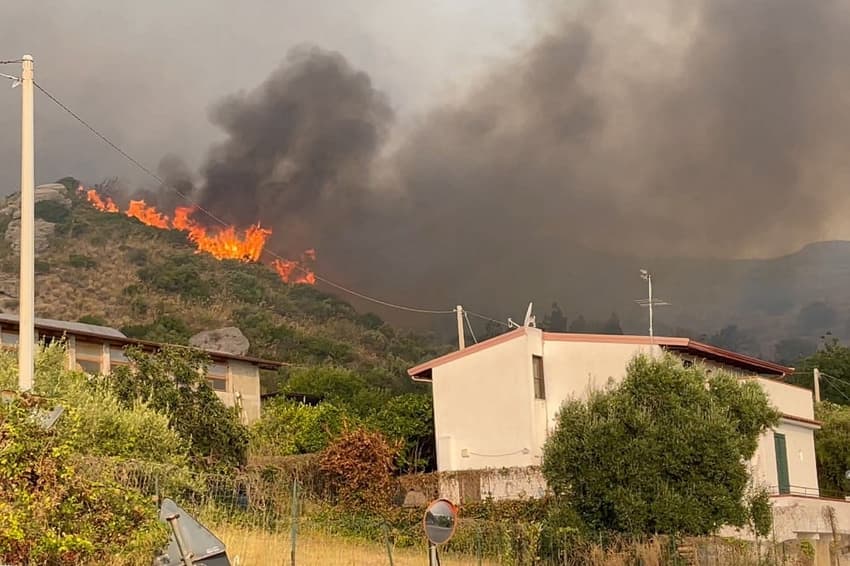Italy records 11 'extreme weather events' per day in 2023

With more severe weather, Italy's climate is turning 'tropical', making 2023 the third hottest in more than 200 years, a new study revealed.
Hailstorms, tornadoes, floods, heatwaves and thunderstorms have been a common occurrence in Italy this year, causing serious damage to both people and property.
The peninsula experienced 11 such extreme weather events per day on average in 2023, according to a new report by agricultural association Coldiretti.
READ ALSO: Two dead after flooding and storms hit northern Italy
As Italy braces for the third heatwave of the summer from this weekend, the study noted that this year ranks as the third hottest in Italy since the year 1800.
The data indicated a temperature increase of 0.67 degrees Celsius above the historical average since surveys began.
Based on the first seven months of the year, the organisation confirmed an "overheating trend" for the country, "where the ranking of the hottest years in the last two centuries is concentrated in the last decade".
In order this includes 2022, 2018, 2015, 2014, 2019 and 2020.
Soaring temperatures are accompanied by increasing amounts of extreme weather events, according to Coldiretti's analysis, based on data from the European Severe Weather Database (ESWD).
READ ALSO: Scientists urge Italy’s media to improve climate change reporting
"We are facing a clear trend towards tropicalisation with a higher frequency of violent events, seasonal displacements, short and intense rainfall and the rapid transition from hot to bad weather," the study noted.
"The year 2023 was marked first by a severe drought that compromised field crops and then for several months by the multiplication of extreme weather events, heavy rainfall and low temperatures, and finally by the blazing heat of July," it added.

A car whose front shield was damaged in connection with severe hail in northern Italy. (Photo by Mads Claus Rasmussen / Ritzau Scanpix / AFP)
July marked a staggering 42 extreme weather events per day in Italy, "practically doubling (+83 percent) compared to the same period last year," reported Coldiretti.
Last month also recorded a temperature of 1.96 degrees Celsius above the average for July, drying up land and leading to fires in the countryside.
READ ALSO: How badly is Italy affected by wildfires this summer?
Increasingly hotter temperatures and violent weather have had a significant impact on Italian agriculture in 2023.
Damage to crops and infrastructure will exceed last year's 6 billion euros, noted the report.
This includes over 1 billion euros of devastation caused by the floods in Emilia-Romagna alone.
What this means for people in Italy is a scarcity of certain foods.
"As a result of climate change, this year's wheat production has been cut by 10 percent, wine grapes by 14 percent and pears by 63 percent," findings showed.
The honey harvest also dropped by 70 percent compared to last year, and the tomato crop has slumped.
Other fruit and vegetables are "also in difficulty", according to the analysis.
Burnt by extreme heat, people in Italy are seeing a lack of certain produce across the board "from grapes to melons, watermelons to apricots and from tomatoes to aubergines."
Comments
See Also
Hailstorms, tornadoes, floods, heatwaves and thunderstorms have been a common occurrence in Italy this year, causing serious damage to both people and property.
The peninsula experienced 11 such extreme weather events per day on average in 2023, according to a new report by agricultural association Coldiretti.
READ ALSO: Two dead after flooding and storms hit northern Italy
As Italy braces for the third heatwave of the summer from this weekend, the study noted that this year ranks as the third hottest in Italy since the year 1800.
The data indicated a temperature increase of 0.67 degrees Celsius above the historical average since surveys began.
Based on the first seven months of the year, the organisation confirmed an "overheating trend" for the country, "where the ranking of the hottest years in the last two centuries is concentrated in the last decade".
In order this includes 2022, 2018, 2015, 2014, 2019 and 2020.
Soaring temperatures are accompanied by increasing amounts of extreme weather events, according to Coldiretti's analysis, based on data from the European Severe Weather Database (ESWD).
READ ALSO: Scientists urge Italy’s media to improve climate change reporting
"We are facing a clear trend towards tropicalisation with a higher frequency of violent events, seasonal displacements, short and intense rainfall and the rapid transition from hot to bad weather," the study noted.
"The year 2023 was marked first by a severe drought that compromised field crops and then for several months by the multiplication of extreme weather events, heavy rainfall and low temperatures, and finally by the blazing heat of July," it added.

July marked a staggering 42 extreme weather events per day in Italy, "practically doubling (+83 percent) compared to the same period last year," reported Coldiretti.
Last month also recorded a temperature of 1.96 degrees Celsius above the average for July, drying up land and leading to fires in the countryside.
READ ALSO: How badly is Italy affected by wildfires this summer?
Increasingly hotter temperatures and violent weather have had a significant impact on Italian agriculture in 2023.
Damage to crops and infrastructure will exceed last year's 6 billion euros, noted the report.
This includes over 1 billion euros of devastation caused by the floods in Emilia-Romagna alone.
What this means for people in Italy is a scarcity of certain foods.
"As a result of climate change, this year's wheat production has been cut by 10 percent, wine grapes by 14 percent and pears by 63 percent," findings showed.
The honey harvest also dropped by 70 percent compared to last year, and the tomato crop has slumped.
Other fruit and vegetables are "also in difficulty", according to the analysis.
Burnt by extreme heat, people in Italy are seeing a lack of certain produce across the board "from grapes to melons, watermelons to apricots and from tomatoes to aubergines."
Join the conversation in our comments section below. Share your own views and experience and if you have a question or suggestion for our journalists then email us at [email protected].
Please keep comments civil, constructive and on topic – and make sure to read our terms of use before getting involved.
Please log in here to leave a comment.